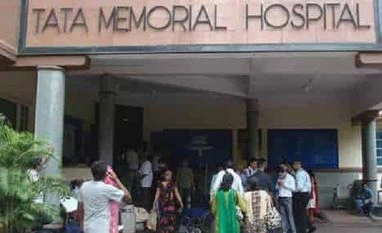A clinical trial conducted at the Tata Memorial Centre (TMC) has indicated that a simple, low-cost intervention can drastically increase the cure and survival rate among breast cancer patients, top officials said here on Monday.
The landmark multi-centre clinical trials were conducted in women undergoing breast cancer surgery and it emerged that injection of a commonly used drug around the tumour - just prior to surgery, on the operation table - could drastically enhance the cure and survival rate of the patients on a long-term basis.
Director of TMC, Rajendra Badwe, who carried out the trials, presented the results at the ongoing European Society of Medical Oncology Congress in Paris on Monday, and simultaneously TMC's professor Sudeep Gupta addressed the media on the findings in Mumbai.
The trial outcome shows that the injection needs no additional expertise, is affordable, barely Rs 100 per patient, but can result in saving at least 100,000 lives of breast cancer patients annually worldwide, said Badwe.
In comparison, expensive, targeted drugs costing over Rs 10 lakh per patient have shown far less benefits in early breast cancer patients, as per the study titled 'Effect of Peri-Tumoral Infiltration of Local Anaesthetic Prior to Surgery on Survival in Early Breast Cancer'.
Spearheaded by Badwe, the study was conducted on 1,600 women planning to undergo early breast cancer surgery at 11 cancer centres in India, including TMC, over 11 years from 2011-2022, said Gupta.
"This is the first study of its kind globally showing a sizable benefit by single intervention prior to surgery. For scientists, it opens a window of peri-operative intervention to modulate the environment of cancer in such a way as to prevent its deleterious reaction to the surgery," Badwe told the Paris conference.
Also Read
Gupta said in Mumbai that the inexpensive and immediately implementable treatment in breast cancer can be practised by any surgeon who treats the disease, as shown from a large randomised trial, which is the 'gold standard' of evaluating the worth of new treatments.
Detailing on the study, the duo said half the patients (out of the 1,600) were part of the 'control group', who received standard surgery followed by the usual post-operative treatment comprising chemotherapy, radiotherapy and hormone therapy as per guidelines.
The other half was the intervention group, who received an injection of a common local anaesthesia agent, 0.5 per cent lidocaine, all around the tumour just before the surgery, and later underwent the same post-operative treatment as given to the control group.
After treatment, the patients were regularly followed-up for several years till the cut-off date of September 2021 to compare the cure and survival rates between the control group and the local anaesthesia group.
"As expected, there was no toxicity of lignocaine in patients who received it (the injection). The six-year disease-free survival was 81.7 per cent in the control group and 86.1 per cent in the local anaesthesia group for a 26 per cent relative reduction in the risk of a relapse or death - considered significant in statistical terms.
Similarly, the six-year over survival rate was 86.2 per cent versus 89.9 per cent in the two groups for a 29 per cent reduction in death risk with the local anaesthetic injection, again critically important, said Badwe.
His earlier research suggested a window of opportunity just prior to, during and immediately after surgical removal of the primary cancer when anti-cancer interventions could reduce the risk of development of disseminated Stage 4 metastatic cancer during the patient's lifespan.
The institutions where the clinical trials were conducted are: TMC Mumbai, Kolhapur Cancer Centre, Sterling Multi-speciality Hospital, Pune, and Siddhivinayak Ganapati Cancer Hospital, Sangli (all Maharashtra); All India Institute of Medical Sciences and Max Superspeciality Hospital (both Delhi); B. Borooah Cancer Centre, Guwahati; Basavatarakam Indo-American Cancer Hospital & Research Centre, Hyderabad; Gujarat Cancer & Research Institute, Ahmedabad; Malabar Cancer Centre, Thalassery (Kerala); and North-Eastern Indira Gandhi Regional Institute of Health & Medical Sciences, Shillong.
--IANS
qn/arm
(Only the headline and picture of this report may have been reworked by the Business Standard staff; the rest of the content is auto-generated from a syndicated feed.)
)